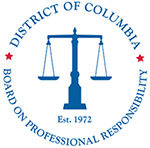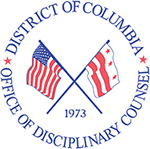- For the Public
- For Lawyers
- Board on Professional Responsibility
- Office of Disciplinary Counsel
- Disciplinary Decisions
-
Attorney Discipline News
- Administrative Order 2020-8: Live Streams of Hearing Committee Proceedings
- Administrative Order 2023-1: Return to In-Person Proceedings
- The Court of Appeals Makes Appointments to the Board on Professional Responsibility
- Amendments to the Rules of the Board on Professional Responsibility
- Amendments to the Rules of the Board on Professional Responsibility
- Volunteer Opportunities
From Washington Lawyer, October 2012
By Joe Perry
In August the American Bar Association (ABA) held its annual meeting in Chicago where President Laurel G. Bellows, in accepting her new post, stated that “lawyers matter.”[1] She further praised members of her profession for being “the first responders when liberty and justice are imperiled.”[2]
Meanwhile, outgoing ABA President Wm. T. Robinson III took the opportunity to focus on law students and young lawyers beginning their careers. Robinson reaffirmed the ABA’s commitment to improving legal education, and he noted that “law students and young lawyers are understandably concerned as they begin their careers in such a difficult economy and feel especially vulnerable to downward shifts in the marketplace.”[3]
A troubled economy is only one component of the brave new world young lawyers face. For many, cross-border practice is becoming an inescapable reality, and much of the recent work of the ABA appears to address this development. At the annual meeting, the House of Delegates amended the ABA Model Rule for Admission by Motion, shortening the amount of time an attorney is required to practice in a foreign jurisdiction before gaining admission.[4] The House also approved a new Model Rule allowing lawyers to practice for up to a year in a new jurisdiction, pending admission.[5] Comment [1] of the new Model Rule explains that the “rule recognizes that a lawyer admitted in another jurisdiction may need to relocate to or commence practice in this [other] jurisdiction, sometimes on short notice.”[6]
The work of the ABA demonstrates that, in addition to being mobile, lawyers—both young and formerly young—are faced with the need to be technologically savvy. Perhaps most notably, the House of Delegates approved new commentary to ABA Model Rule 1.1, which states that lawyers must keep abreast of changes in the law and its practice, “including the benefits and risks associated with relevant technology.”[7]
Although Bar Counsel cannot speculate as to how any of the specific changes put forth by the ABA might one day be reflected in our own Rules of Professional Conduct, we, like anyone else, can observe that these changes reflect new realities. And as realities change, so, too, must the lawyer. Even attorneys who choose to stay put are finding that the nature of today’s practice is dragging them into other jurisdictions, leading to questions on unauthorized practice and conflicts of laws. Meanwhile, as fast as our practice expands, technology develops; whatever the minimal amount of technological aptitude required to be ethically competent, those unwilling to learn can expect to face a loss of clientele.
As to the latter concern, at least, the profession can seek help within its ranks. For many attorneys, younger colleagues often understand more about technology, and those working on the same caseload are in a particularly good position to provide relevant advice. Put another way, we have reached a point where the relationship between a young lawyer and his or her seasoned mentor is more symbiotic than ever.[8]
Something to think about if you can actually keep a young lawyer in your jurisdiction long enough for a tutorial. It is hard to imagine a future where lawyers still “matter” and are the “first responders” to threatened rights if we, as a profession, fail to educate ourselves about and master the newest forms of communication.
Joe Perry is a senior staff attorney in the Office of Bar Counsel.
Notes
[1] See Cassens Weiss, D., ‘Lawyers Matter,’ ABA President Laurel Bellows Tells House of Delegates, bit.ly/UgFffN(last visited Aug. 17, 2012).
[3] See Cassens Weiss, D., Outgoing ABA President Emphasizes Commitment to Young Lawyers, bit.ly/PSkQNI (last visited Aug. 17, 2012).
[4] See House of Delegates Resolution 105E (last visited Aug. 17, 2012).
[5] See House of Delegates Resolution 105D (last visited Aug. 17, 2012).
[7] See Cassens Weiss, D., Lawyers Have Duty to Stay Current on Technology’s Risks and Benefits, New Model Ethics Comment Says (last visited Aug. 17, 2012).
[8] Bar Counsel notes that the new James Bond movie is only weeks away. Longtime fans might notice that for the first time in history, Q, the man who provides the world’s greatest superspy with all of his technical gadgets, is younger than his charge. It may be that a younger actor sells more tickets, but this sudden change in the Bond legacy could be easily viewed as a case of art imitating life.
Disciplinary Actions Taken by the Board on Professional Responsibility
Original Matters
IN RE AMAKO N. K. AHAGHOTU. Bar No. 352237. July 20, 2012. The Board on Professional Responsibility recommends that the D.C. Court of Appeals disbar Ahaghotu for reckless misappropriation, in addition to other Rule violations. The violations stemmed from Ahaghotu’s handling of his escrow account and his representation of a client in a personal injury matter. Specifically, Ahaghotu violated Rules 1.15(a) (commingling, failure to maintain adequate escrow records, and misappropriation); D.C. Bar R. XI, § 19(f); former Rule 1.17(a) (whose prescriptions are now found at Rule 1.15(b)) (improperly designated escrow account); and Rule 1.3(c) and former Rule 1.15(b) (now redesignated as Rule 1.15(c)) (delayed disbursement of client funds).
IN RE PAUL SHEARMAN ALLEN. Bar No. 167940. July 13, 2012. The Board on Professional Responsibility recommends that the D.C. Court of Appeals disbar Allen by consent.
IN RE STEPHANIE Y. BRADLEY. Bar No. 288910. July 31, 2012. The Board on Professional Responsibility recommends that the D.C. Court of Appeals suspend Bradley for two years with fitness for engaging in ethical misconduct in two unrelated matters. Specifically, in the first matter while serving as a court-appointed guardian, Bradley failed to provide competent representation and to represent the ward with the skill and care commensurate with that generally afforded by lawyers in similar matters, failed to represent the ward with zeal and diligence, intentionally failed to seek the lawful objectives of the ward, failed to act with reasonable promptness, and engaged in conduct that seriously interferes with the administration of justice. In the second matter, while serving first as a court-appointed guardian and conservator for a ward, then as personal representative to the ward’s estate after the ward died, Bradley failed to provide competent representation and to represent the ward with the skill and care commensurate with that generally afforded by lawyers in similar matters, failed to represent the ward with zeal and diligence, intentionally failed to seek the lawful objectives of the ward, failed to act with reasonable promptness, and engaged in conduct that seriously interferes with the administration of justice. Rules 1.1(a), 1.1(b), 1.3(a), 1.3(b), 1.3(c), and 8.4(d).
IN RE KENNETH M. ROBINSON. Bar No. 51706. July 31, 2012. The Board on Professional Responsibility recommends that the D.C. Court of Appeals suspend Robinson for seven months. Robinson engaged in negligent misappropriation of client settlement funds, failed to promptly pay a client the settlement funds due her for more than three years, and failed in his duty to supervise his associate in order to ensure that his escrow account was properly maintained after receiving notice that his trust account was overdrawn. Rules 1.15(a), 1.15(b), and 5.1(a).
Disciplinary Actions Taken by the District of Columbia Court of Appeals
Original Matters
IN RE JESSE H. INGRAM. Bar No. 387629. July 5, 2012. The D.C. Court of Appeals disbarred Ingram by consent, effective immediately.
IN RE JACK B. JOHNSON. Bar No. 344291. July 12, 2012. The D.C. Court of Appeals disbarred Johnson based upon his conviction of crimes of moral turpitude per se, for which disbarment is mandatory under D.C. Code § 11-2503(a) (2001). Johnson pled guilty to violating 18 U.S.C. § 1951 (attempted extortion under color of official right) and 18 U.S.C. § 1512 (b)(2)(B) (attempted witness and evidence tampering).
Reciprocal Matters
IN RE FREDERICK W. SALO. Bar No. 446236. July 19, 2012. In a reciprocal matter from New York, the D.C. Court of Appeals imposed non-identical reciprocal discipline and suspended Salo from the practice of law for six months. The New York Supreme Court, Appellate Division, First Judicial Department found that Salo misappropriated entrusted funds, but because his actions were nonvenal by reason of posttraumatic stress disorder, the New York court suspended him from the practice of law for one year with the equivalent of a requirement that he demonstrate his fitness to resume the practice of law.
The Office of Disciplinary Counsel compiled the foregoing summaries of disciplinary actions. Informal Admonitions issued by Disciplinary Counsel and Reports and Recommendations issued by the Board on Professional Responsibility are posted at www.dcattorneydiscipline.org. Most board recommendations as to discipline are not final until considered by the court. Court opinions are printed in the Atlantic Reporter and also are available online for decisions issued since August 1998. To obtain a copy of a recent slip opinion, visit www.dccourts.gov/internet/opinionlocator.jsf.
- For the Public
- For Lawyers
- Board on Professional Responsibility
- Office of Disciplinary Counsel
- Disciplinary Decisions
-
Attorney Discipline News
- Administrative Order 2020-8: Live Streams of Hearing Committee Proceedings
- Administrative Order 2023-1: Return to In-Person Proceedings
- The Court of Appeals Makes Appointments to the Board on Professional Responsibility
- Amendments to the Rules of the Board on Professional Responsibility
- Amendments to the Rules of the Board on Professional Responsibility
- Volunteer Opportunities

- Board on Professional Responsibility
- 430 E Street NW
- Suite 138
- Washington, DC 20001
- Phone: 202-638-4290
- Fax:

- Office of Disciplinary Counsel
- District of Columbia Court of Appeals
- 515 5th Street, NW
- Building A, Suite 117, Washington, DC 20001
- Phone: 202-638-1501
- Fax: 202-638-0862

